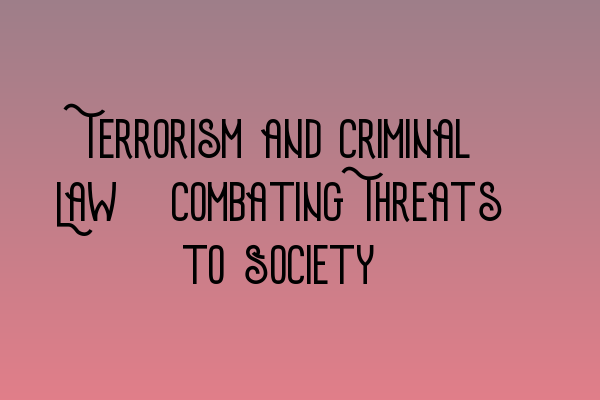Terrorism and Criminal Law: Combating Threats to Society
Terrorism is a heinous crime that poses a significant threat to society. It not only endangers the lives of innocent people but also undermines the fundamental principles of democracy and freedom. In recent years, the rise of terrorist activities has necessitated a robust response from criminal law practitioners and policymakers to ensure the safety and security of our communities.
Understanding Terrorism
Before delving into the legal aspects of combating terrorism, it is essential to understand what constitutes terrorism. Terrorism refers to the use of violence, intimidation, and coercion in pursuit of political, ideological, or religious objectives. Acts of terrorism can range from bombings and shootings to cyber attacks and biological warfare.
The motivations behind terrorism are often complex, rooted in grievances, political ideologies, or extremist beliefs. Regardless of the underlying reasons, the impact of terrorism on society is devastating, causing irreparable harm to individuals and communities.
Criminal Law and Terrorism
Criminal law plays a crucial role in combating terrorism. It provides a legal framework for identifying, investigating, prosecuting, and punishing individuals involved in terrorist activities. Proactive measures and effective legislation are necessary to prevent, deter, and respond to acts of terrorism.
Legislation specifically targeting terrorism has been enacted in many countries, including the UK. The Terrorism Act 2000 and the Counter-Terrorism Act 2008 are examples of legislation that empowers law enforcement agencies to tackle terrorism effectively.
How Criminal Law Combats Terrorism
There are several key legal tools and strategies employed in the fight against terrorism:
1. Surveillance and Intelligence Gathering
Law enforcement agencies utilize surveillance techniques and gather intelligence to identify potential threats and disrupt terrorist activities. This may include monitoring communications, tracking financial transactions, and conducting undercover operations.
2. Investigation and Arrest
When a terrorist act is suspected, law enforcement agencies launch investigations to collect evidence and apprehend the individuals responsible. Specialized units, such as anti-terrorism squads, work tirelessly to gather intelligence, interview witnesses, and build a case against the perpetrators.
3. Prosecution and Trial
Once individuals involved in terrorism have been apprehended, they are brought to trial. Prosecutors play a crucial role in presenting the evidence and establishing guilt beyond a reasonable doubt. Terrorism trials often require additional security measures to protect the safety of those involved.
4. Preventive Measures
To combat terrorism effectively, criminal law also focuses on preventive measures. This includes implementing measures to identify and disrupt radicalization processes, promoting community engagement, and fostering partnerships between law enforcement agencies and communities.
The Challenges of Combating Terrorism
While criminal law plays a pivotal role in combating terrorism, there are several challenges that practitioners face:
1. Evolving Tactics
Terrorist organizations constantly adapt their tactics to evade detection and continue their activities. Staying ahead of these evolving tactics requires constant vigilance, advanced technological capabilities, and international cooperation.
2. Safeguarding Civil Liberties
While combating terrorism, it is essential to strike a balance between security measures and safeguarding civil liberties. Ensuring that investigative techniques and legislation do not disproportionately infringe upon individual rights is crucial.
3. International Cooperation
Terrorism knows no boundaries. Effective combatting of terrorism requires close cooperation and collaboration between countries, sharing intelligence and resources to dismantle transnational terrorist networks.
Conclusion
Combating terrorism is an ongoing battle that requires a multifaceted approach. Criminal law plays a vital role in this fight, providing the legal framework and tools to identify, investigate, prosecute, and prevent terrorist activities. However, the challenges posed by terrorism necessitate constant adaptation, international cooperation, and the preservation of civil liberties. As criminal law practitioners, it is our duty to remain dedicated to upholding the principles of justice while tirelessly working towards eliminating the threat of terrorism from our society.
Related Articles:
- SQE Exam Prep: Essential Study Materials for Aspiring Solicitors
- Demystifying the Solicitors Qualifying Examination Format
- SQE Exam for International Lawyers: Challenges and Success Strategies
- LLC Formation Made Simple: Step-by-Step Guide for UK Entrepreneurs
- LLC Formation: A Step-by-Step Guide for UK Entrepreneurs
